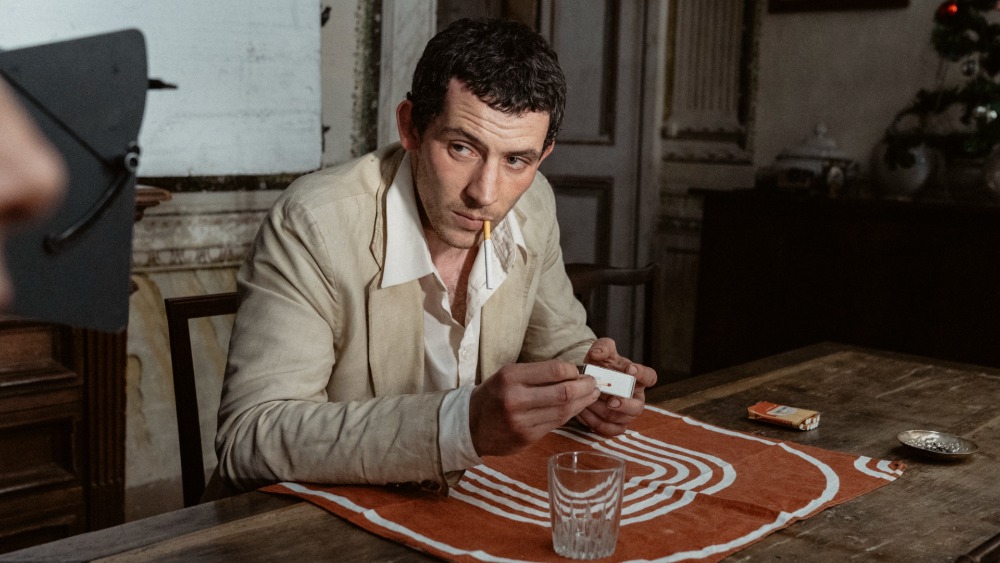
In “La Chimera,” the ancient past nestles mere inches below the surface of the present, eventually breaking above ground and disrupting, if not the space-time continuum, the more mundane order of things. The borders between life and death feel similarly frictious and permeable, as if we could merely visit one from the other, as easily as sleeping and waking. Arthur (Josh O’Connor), the wandering Brit at the center of Alice Rohrwacher’s marvelously supple and sinuous new film, is accustomed to such limbo states. So are admirers of Rohrwacher’s filmmaking, which, in this eccentric, romantic tale of competing grave-robbers in Central Italy, touches the transcendental without diving into the outright fabulism of 2018’s “Happy as Lazzaro.”
Grounding the feyer impulses of “La Chimera” — a return for Rohrwacher to more metaphysical musings after the simpler charms of her Oscar-nominated short “Le Pupille” — is, well, the literal ground: grubby and gritty and, in this region of Italy, packed with archaeological delights from the Etruscan era. Here, you can take a spade to just about any patch of land and, in minutes, uncover a literal wealth of millennia-old vases, utensils and ornaments. It is the early 1980s, and bands of tombaroli (illegal grave-robbers with an eye for an artefact) are cashing in, digging up once-sacred objects and selling them on to the elite ancient art market. What use are they underground, after all? The tombaroli are no more sentimental about the goods they dig up than a potato farmer is about his crop: It’s a living, and notwithstanding interference from the police and infighting among them, it’s an easier one than many.
Arthur, wonderfully played by O’Connor with a loping gait and a muttering command of Italian, is something of a lone-wolf tombarolo, occasionally collaborating with one particularly rowdy, raucous gang of thieves, but with a solitary mission and motives that he keeps close to his scrawny chest. In his cream-colored linen suit, he looks from a distance the very model of the rakish, slightly disreputable Englishman abroad — a suitably colonial image for a man extracting the treasures of a country not his own. Any glamor associated with that archetype evaporates, however, upon closer inspection of said suit. Crumpled and ill-fitting, with streaks of grime at the lapels that broaden and darken as the film progresses, it looks like it may have been plundered from a gravesite too.
Newly released from a short prison spell as the film opens, Arthur is adrift in Italy and in his own mind — his dreams and waking thoughts continually spliced with memories of Beniamina, the young, limpidly smiling Italian woman who once loved him, and who appears to be no more. He seeks refuge in the crumbling, fresco-adorned villa owned by her mother Flora (Isabella Rossellini, a joy), where she awaits her daughter’s return with an optimism not shared by Beniamina’s ghastly, grasping sisters — collectively eager to shuffle her off to a nursing home — and teaches classical singing to Italia (Carol Duarte, the Brazilian star of “Invisible Life”), a keen but tone-deaf waif who does domestic chores in exchange for her tuition.
Flora dotes on Arthur as a kind of proxy for her daughter, but he otherwise resists close human alliances, largely saving his heart for the absent or the dead. Though he falls in with Pirro (Vincenzo Nemolato), the gregarious ringleader of a particularly motley crew of tombaroli, and joins in their vaudeville-style carousing between digging expeditions, he gives away so little of himself as to be a pallid puzzle in their midst. Their divergent principles of thieving, meanwhile, come between them when they hit the Etruscan mother lode: a magnificent, fully intact Chimera statue worth inestimable millions. Only Italia, it seems, might just like Arthur for Arthur, but she too has his ghosts to compete with.
Shooting fluidly on multiple film formats — 35mm, 16mm and Super 16 — in the bleachy sky blues and earth tones that have by now become a signature palette, Rohrwacher and her regular DP Hélène Louvart make a virtue of this skittering, literally shape-shifting visual quality, as the shifts in grain, light and frame dimensions from one sequence to the next denote the film’s own transient sense of reality, and the states of earthy pragmatism and mournful reverie between which Arthur hovers. Is he sampling death every time he ventures underground, trying it on for size, at least until he finds something to live for above the surface? Is trading in the currency of the past a way to distance himself from a lonesome present?
Raffish and boyish at the same time — or switching between either mode as a cover for the other — O’Connor’s deft, droll performance implies such possibilities without sentimentalizing them. There’s a persistently stoic air to his stooping melancholy that only rarely gives way to a mischievous smile or a sudden, strident, slightly embarrassing flare of anger. His quiet curiosity as a performer makes him a good match for this somehow most generously elusive of filmmakers, who here offers all her earthly and otherworldly preoccupations in scattered, bejeweled fragments, for us to gather and assemble and interpret — and doesn’t much mind if some pieces stay buried.













